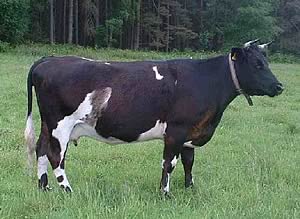 |
|||||||||
|
|||||||||||||||||||
|
|
FAO Sounds Alarm on Loss of Livestock
Breeds Calling the rate of livestock breed extinctions “alarming”, FAO today urged the international community to adopt a global plan of action to stem erosion of the world’s farm animal diversity and protect the global food supply.
“Wise management of the world’s animal genetic resources is of ever greater importance,” said FAO Assistant Director-General Alexander Müller, addressing participants at the first International Technical Conference on Animal Genetic Resources for Food and Agriculture here today. “The options that these resources offer for maintaining and improving animal production will be of enormous significance in the coming decades,” he said. “Climate change and the emergence of new and virulent livestock diseases highlight the importance of retaining the capacity to adapt our agricultural production systems.” Livestock breeding is crucial in this respect, FAO believes. Many breeds at risk of extinction have unique characteristics that may be useful in confronting these and other challenges in the years to come, FAO says. Traits such as resistance to disease or adaptation to climatic extremes could prove fundamental to the food security of future generations. Moreover, widely used breeds need to be managed more wisely. Among many of these breeds, within-breed genetic diversity is being undermined by the use of a few highly popular sires for breeding. Lost forever According to FAO’s State of the World’s Animal Genetic Resources report, at least one livestock breed a month has become extinct over the past seven years, which means its genetic characteristics have been lost forever. Around 20 percent of the world’s breeds of cattle, goats, pigs, horses and poultry are currently at risk of extinction, according to the report, the first global assessment of livestock biodiversity and of the capacity of countries to manage their animal genetic resources. “In this situation, the world cannot simply take a business-as-usual, wait-and-see attitude,” said Müller. “Climate change means that we are entering a period of unprecedented uncertainty and crisis, which will affect every country.” Müller highlighted climate change as a significant factor to be added to many other threats to livestock breeds. These include rapid, poorly regulated economic and social changes; increasing reliance on a small number of high-output breeds; animal diseases; and poverty, socio-economic instability and armed conflict in some of the areas richest in animal genetic resources. He said that urgent action was required to improve opportunities, through appropriate policies and technologies, for the better utilization of animal genetic diversity. Sustainable use and genetic improvement are therefore key components of the global plan of action as they largely determine the opportunities for genetic resources conservation. Breed characterization is equally important, Müller said, and gaps and weaknesses in developing countries’ abilities to inventory, characterize, conserve and use their livestock breeds must be addressed. “Although animal genetic resources are important for everyone, they are particularly important for many livelihoods in developing countries, often of the very poorest,” said Müller. He stressed the need for governments to assist poor livestock keepers, who are the custodians of a large proportion of animal genetic diversity. Historic opportunity Representatives of over 120 countries are meeting in Interlaken to negotiate and adopt a Global Plan of Action for Animal Genetic Resources. The plan will comprise strategic priority areas as well as provisions for implementation and financing. “The Interlaken Conference represents a historic opportunity for the international community to make strategic choices regarding the future management of animal genetic resources and to reach a consensus on priority measures for their sustainable use, development and conservation,” said Swiss Federal Councillor for Economic Affairs Doris Leuthard at the opening of the meeting. She highlighted Swiss efforts to protect the country’s rich animal diversity, which includes around 90 breeds of cattle, horses, pigs, sheep and goats, but acknowledged that not all countries have the resources necessary to support such conservation efforts. The Swiss Government will continue to support FAO’s efforts and cooperate within appropriate international fora, she said. “Interlaken is an important step,” Ms Leuthard said, “but it is only a step. The road is long and much remains to be done.” Over 300 policy-makers, scientists, breeders and livestock keepers are expected to attend the meeting, organized by FAO and hosted by the Government of Switzerland, which runs from 3-7 September. |
||||||||||||||||||

|
|
||||||||||||||||||
| home | agri-services | pedigree
pen | news | dairy | beef | machinery property | organisations | site map |
|||||||||||||||||||

